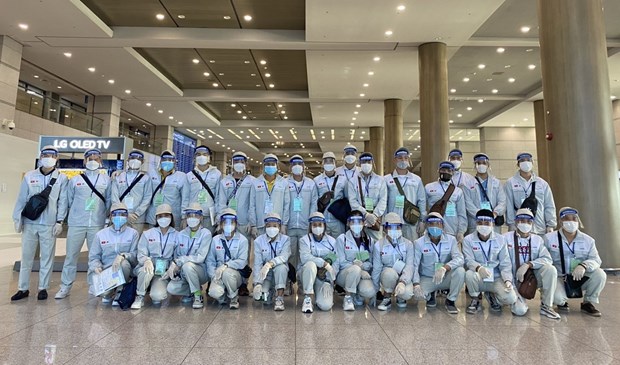 Society
Society

The number of Vietnamese workers entering the Republic of Korea (RoK) is expected to rise, reaching 183 at the end of this month, according to the Management Board of Vietnamese Labourers in RoK.

|
| Vietnamese labourers at Incheon airport, the Republic of Korea. VNA/VNS Photo |
SEOUL — The number of Vietnamese workers entering the Republic of Korea (RoK) is expected to rise, reaching 183 at the end of this month, according to the Management Board of Vietnamese Laborers in RoK.
The number of Vietnamese guest workers has increased after the RoK lifted the restriction on the number of weekly and daily entries in order to adapt to the "living with COVID-19" plan that the government is implementing.
Under the plan, foreign workers from all countries will be allowed to enter the RoK if they are confirmed to be fully vaccinated against COVID-19 and hold RT-PCR test results negative for COVID-19.
According to Tạ Thị Thanh Thuỷ, head of the Management Board of Vietnamese Labourers in the RoK, workers entering the RoK only have to be quarantined for 10 days instead of 14 days. Unvaccinated workers will be arranged for COVID-19 vaccination soon after completing isolation.
New regulations help reduce costs and create favourable conditions for both employees and employers as Korean small and medium enterprises face a labour shortage due to restrictions imposed by the government to combat the spread of coronavirus, Thuỷ told the Vietnam News Agency.
Hyun Hey Yong, director of the JI Korea Auto Parts Company, said her company started hiring Vietnamese workers in 2015. Some workers had returned home and were recruited again because they worked well, she said, adding that it currently employed five Vietnamese workers.
A representative of Haesung Metal Co.Ltd said it was waiting to receive more guest workers. Due to the pandemic, foreign workers were restricted from entering RoK, making it difficult for small businesses, he said.
The representative appreciated Vietnamese labourers for their hard work and compliance with pandemic prevention and control regulations.
Restrictions on entry as well as those relating to quarantine have caused the number of foreign workers entering the RoK to drop sharply from an average of 50,000 people per year before the pandemic to less than 7,000 people last year.
The RoK is one of the key labour markets of Việt Nam. To offer better support for Vietnamese labourers, the Ministry of Labour, Invalids and Social Affairs decided to establish an office under the RoK’s Employment Permit System (EPS) programme in 2013.
Phạm Minh Đức, head of the office, said in collaboration with Việt Nam’s labour management board in the RoK, it had met with and provided direct consultations for thousands of labourers on weekends. The office had also offered between 100 and 150 consultations over the phone per week.
According to Đức, these activities had made an important contribution to supporting Vietnamese workers, thus reducing the rate of illegal labourers in the RoK from 40 per cent in 2013 to less than 26 per cent in 2020.
He suggested speeding up procedures to send qualified workers to the RoK soon.
Priority should be given to the vaccination of workers so that Vietnamese workers could enjoy preferential treatment when entering the country, Đức said, adding that the Korean language exams should be quickly completed at the same time to facilitate labourers’ entry in the future. — VNS